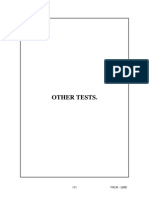QCS 2010 Evennes PDF
Uploaded by
Nadine BarghothiQCS 2010 Evennes PDF
Uploaded by
Nadine BarghothiQCS 2010 Section 6 Part 5 Asphalt Works Page 26
4 The tolerances herein specified shall not invalidate the tolerances set forth for the evenness
of surface of the asphalt paving course.
5 As directed by the engineer the laid thickness shall be checked by cutting test pits and/or
using Ground Penetrating Radar (GPR) for the determination of the structural capacity of the
pavement.
5.11.6 Evenness of Surface
1 The Engineer shall test the evenness of surface for each course of the various asphalt
paving courses to determine compliance.
2 The Contractor shall put at the disposal of the Engineer a 3 m long straightedge and a crown
template of sturdy and approved design and enough labour to assist in the checking
Qatar Project Management
operations.
3 Any layer containing deviations or variations exceeding the tolerances specified here shall
be corrected or removed and replaced in accordance with the instructions of the Engineer
and to his satisfaction.
4 The longitudinal regularity of the surface of the wearing course shall be within the relevant
limits given in Table 5.3.
Table 5.3
Wearing Course Road Surface
Irregularity 4 mm 7 mm
Length (m) 300 75 300 75
Minor Roads 40 18 4 2
Major Roads1 20 9 2 1
1- Major Roads shall mean primary, secondary and any dual carriageways. Minor Roads are all other roads.
5 Any irregularity is a variation of not less than 4 mm or 7 mm of the profile of the road surface
as measured by a rolling straight edge. No irregularity exceeding 10 mm shall be permitted.
6 Compliance with Table 5.3 above shall be tested with a rolling straight edge along any line or
lines parallel to the centre line of the pavement on sections of 300 m selected by the
Engineer, whether or not it is constructed in shorter lengths. Sections shorter than 300 m
forming part of a longer pavement shall be assessed using the number of irregularities for a
300 m length prorated to the nearest whole number. Where the total length of pavement is
less than 300 m the measurements shall be taken in 75 m lengths.
7 Pavements shall also be measured transversely for irregularities at points decided by the
Engineer by a 3 m long straight edge placed at right angles to the centre line of the road.
The maximum allowable differences between the pavement surface and the straight edge
shall be 3 mm.
8 For major roads the International Roughness Index (IRI) shall be used to monitor the
roughness and condition of the pavement surface. The acceptable IRI for ride quality shall
be decided by the engineer.
5.11.7 Pavement Evaluation Techniques
1 Pavement evaluation tests shall be carried out for the completed pavement structure at any
point of the road as directed by the Engineer to assess the serviceability condition of the
pavement and verify compliance with specifications.
QCS 2010
You might also like
- Fane Loudspeaker Construction Book (Pages 01 11)56% (9)Fane Loudspeaker Construction Book (Pages 01 11)11 pages
- SOP - 06 - Visual and Dimensional Procedure100% (1)SOP - 06 - Visual and Dimensional Procedure22 pages
- MoRTH Specifications Pocket Book 09.04.2019 FinalNo ratings yetMoRTH Specifications Pocket Book 09.04.2019 Final92 pages
- Speci. Slab Drain On Moti Amrol To Sangpur Road Ta. Jetpur PaviNo ratings yetSpeci. Slab Drain On Moti Amrol To Sangpur Road Ta. Jetpur Pavi116 pages
- Larsen & Toubro Limited - Ecc Division: Page 1 of 3100% (1)Larsen & Toubro Limited - Ecc Division: Page 1 of 33 pages
- Critére D'acceptation PT API 650 ASME VIIINo ratings yetCritére D'acceptation PT API 650 ASME VIII4 pages
- 2024-10-14-Document no_ IRS-T-62- July-2024-Specification(1)No ratings yet2024-10-14-Document no_ IRS-T-62- July-2024-Specification(1)17 pages
- IGGA Guide Specification: Conventional Diamond Grinding For Pavement PreservationNo ratings yetIGGA Guide Specification: Conventional Diamond Grinding For Pavement Preservation5 pages
- critére d_acceptation VT back de stockageNo ratings yetcritére d_acceptation VT back de stockage2 pages
- Asphalt Base, Binder and Wearing Course - Adm Part SpecNo ratings yetAsphalt Base, Binder and Wearing Course - Adm Part Spec9 pages
- 0.1. General Techical Specification - RoadNo ratings yet0.1. General Techical Specification - Road4 pages
- Plagiarism Scan Report: Plagiarised UniqueNo ratings yetPlagiarism Scan Report: Plagiarised Unique2 pages
- Asphalt Paving Course - Adm Standard SpecNo ratings yetAsphalt Paving Course - Adm Standard Spec15 pages
- 87 Venkat NAC QA and QC Training to AE AEE DEE and EE of TS Roads Buildings DepartmentNo ratings yet87 Venkat NAC QA and QC Training to AE AEE DEE and EE of TS Roads Buildings Department86 pages
- Vitrified Clay Pipe: T 281 Methods of Sampling and TestingNo ratings yetVitrified Clay Pipe: T 281 Methods of Sampling and Testing3 pages
- critére d_acceptation MT bac de stockageNo ratings yetcritére d_acceptation MT bac de stockage2 pages
- Hollow Clay Tiles For Floors and Roofs - Specification: Indian StandardNo ratings yetHollow Clay Tiles For Floors and Roofs - Specification: Indian Standard12 pages
- Criterios de Aceptacion y Rechazo Asme ViiiNo ratings yetCriterios de Aceptacion y Rechazo Asme Viii4 pages
- Method Statement - Portland Cement Concrete Pavement100% (2)Method Statement - Portland Cement Concrete Pavement26 pages
- Mandatory Appendix 6 Methods For Magnetic Particle Examination (MT)No ratings yetMandatory Appendix 6 Methods For Magnetic Particle Examination (MT)2 pages
- Design and Specifications of Speed BreakeNo ratings yetDesign and Specifications of Speed Breake8 pages
- Guide Pavement Markings June 2013 Part CNo ratings yetGuide Pavement Markings June 2013 Part C20 pages
- Warringah Council: Development Engineering Minor Works SpecificationNo ratings yetWarringah Council: Development Engineering Minor Works Specification42 pages
- Section 7 - Median, Left Turn, and Right Turn Design RequirementsNo ratings yetSection 7 - Median, Left Turn, and Right Turn Design Requirements7 pages
- Road Construction Method Statement - Levelng Topographical and Cross Sectional SurveyNo ratings yetRoad Construction Method Statement - Levelng Topographical and Cross Sectional Survey5 pages
- Road to Excellence Advanced Concepts in Highway Engineering (Part-3)From EverandRoad to Excellence Advanced Concepts in Highway Engineering (Part-3)No ratings yet
- Construction Methodologies & Procedures for Civil Engineers - Part -1From EverandConstruction Methodologies & Procedures for Civil Engineers - Part -1No ratings yet
- From Wikipedia, The Free Encyclopedia: Nordisk Familjebok: A) Long Splice B)No ratings yetFrom Wikipedia, The Free Encyclopedia: Nordisk Familjebok: A) Long Splice B)4 pages
- Cempatch SBR Method Statement (Liquid Polymer Bonding Agent For Cement Containing Mixes)No ratings yetCempatch SBR Method Statement (Liquid Polymer Bonding Agent For Cement Containing Mixes)3 pages
- Fast Connectors On Howo Truck PDF DownloadNo ratings yetFast Connectors On Howo Truck PDF Download16 pages
- Procurement Plan of Maha-Metro (Nagpur Projects)No ratings yetProcurement Plan of Maha-Metro (Nagpur Projects)2 pages
- Petronas Twin Tower, Kuala Lumpur, Malaysia: By-Nawal Kishor Dwivedi M.Tech Structural Engineering, MNIT JaipurNo ratings yetPetronas Twin Tower, Kuala Lumpur, Malaysia: By-Nawal Kishor Dwivedi M.Tech Structural Engineering, MNIT Jaipur27 pages
- Introduction To Construction Management OneNo ratings yetIntroduction To Construction Management One76 pages
- TWJO-ITP-PRC-0005 Reva2 ITP For PC BoxCul in LBDPTNo ratings yetTWJO-ITP-PRC-0005 Reva2 ITP For PC BoxCul in LBDPT6 pages
- Brega Petroleum Marketing Company PRQ Tobrouk TerminalNo ratings yetBrega Petroleum Marketing Company PRQ Tobrouk Terminal3 pages
- Form 44 Fixed Scaffold Checklist and RegisterNo ratings yetForm 44 Fixed Scaffold Checklist and Register1 page
- Assessment of Structural Integrity of The BuildingNo ratings yetAssessment of Structural Integrity of The Building17 pages

























































































